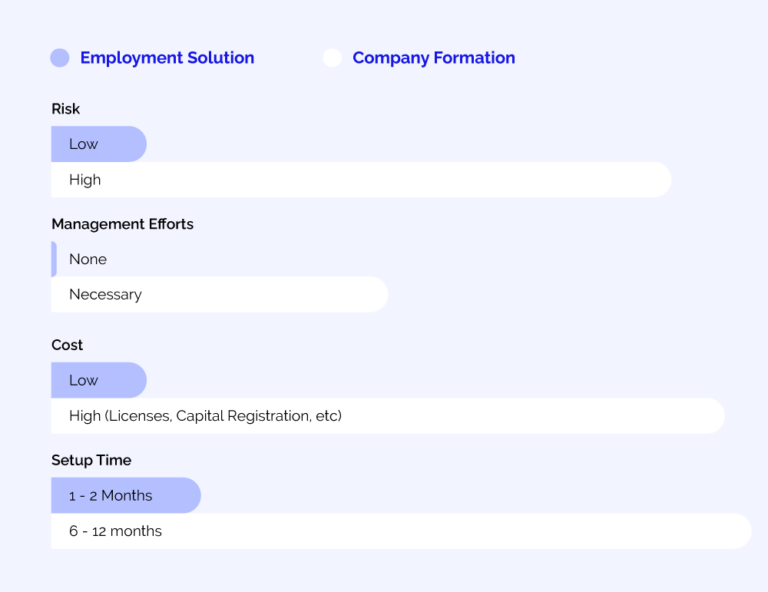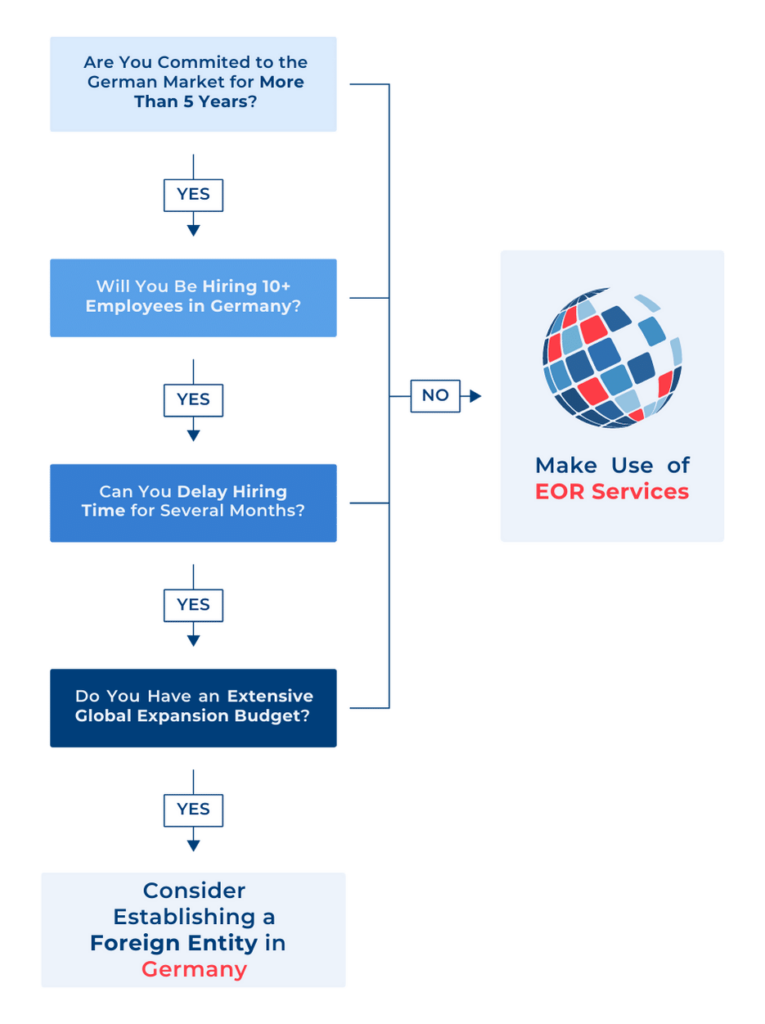Incorporating a company in Germany can be an excessively complex, frustrating process that requires companies to understand local laws in detail and establish a physical presence. Using a PEO in Germany will allow you to begin operating in the country without having to incorporate a new physical entity.
A PEO:


ドイツの習熟作業者派遣組織は、現地で準拠する必要のある規格についての幅広い知識提供だけでなく、トリッキーな行政手続きをうまく切り抜けるためのコンサルティングも可能です。
単純なHRミスでさえ、新しい市場に参入する際のリスク増加と時間浪費につながる可能性があります。 習熟作業者派遣組織はこれらのリスクを軽減し、市場参入時間を短縮し、コストを節約します。
習熟作業者派遣組織は、ドイツでの給与計算のアウトソーシング、管理サービス、および採用戦略を提供できます。 あなたの時間がこれらの仕事に費やされない間、あなたの従業員は会社の成長促進のために努力を注ぐことができます。
ドイツでの会社設立の推定時間: 4〜12か月
ドイツで習熟作業者派遣組織を設立するための推定時間: 5日間 見積もり
我々の日々のニーズはすべて、この1つの窓口で対応できます。これにより、多くのチームメンバーとやり取りする際の誤解を減らし、シンプルなコミュニケーションチェーンを提供します。
ドイツのINSグローバルの習熟作業者派遣組織は、次の4つの簡単な手順に従って、従業員の割り当てと人事管理のニーズを管理します。
お客様とお客様のチームがドイツ市場に参入することを決めたら、御社にとって最良の選択をするためには、以下の潜在的な解決策の違いを完全に知る必要があります。
習熟作業者派遣組織は、他の企業にHRサービスを提供する別個の独立した事務所を運営します
そのサービスには、ドイツでの給与アウトソーシング、税務コンプライアンス、法律相談、コンプライアンス保証などがあります。
雇用代行業者は、別の会社であるという点で習熟作業者派遣組織と同様に機能しますが、あなたに代わって雇用し、あなたの従業員に対して法的な責任も持ちます。
雇用代行業者 は雇用に関連するすべての責任を負います
習熟作業者派遣組織の契約では、契約は御社と従業員の間で維持されます
雇用代行業者 契約では、契約は御社によって指示されますが、雇用代行業者 と従業員の間で実行されます
ドイツには、民法、最低賃金法、雇用時間など、合計で14の労働法および雇用法に関連する情報源があります。
ほとんどの雇用法は、扶養家族のみを対象としています。 ドイツ商法は後に、「自営業」と「雇用者」という用語を正式に区別しました。
ドイツで作成された雇用契約には、通常、開始日、役職、職業説明、場所、休暇、給与などの情報が含まれます。
1時間あたり9.35ユーロの総額を要求する最低賃金法や連邦休暇法など、いくつかの雇用条件が法律で義務付けられています。
連邦労働休暇法は、ドイツの従業員の法定最低休暇日数を規制しています。 最低20営業日は必須の日数となっています。 さらに、各従業員のそれぞれの業界について、集団貿易協定がその業界を規制している場合、その従業員は毎年、より多くの休暇をとることができます。
般的に、ドイツの労働者は、毎年約6週間の休暇が与えられると考えています。その地域が歴史的にカトリックであるかプロテスタントであるかによって、必須の休日は地域ごとに異なります。 あとで、潜在的な誤解を避けるために、市場参入の対象となる地域の包括的な概要を知ることが賢明です。
CIT
ドイツは、世界中で稼いだ所得に対して法人居住者に課税します
ただし、ほとんどのDTT(二重課税防止条約)は、PE(恒久的施設)に帰属する収入をもたらします。 PEを持っている、または財産収入がある非居住者は、ドイツの源泉所得に課税されます。
ロイヤルティを得た人は、源泉徴収によって課税されます。 ほとんどの場合、海外で支払われる利子についてはドイツの税金がまったくかかりません。
ドイツの法人税は15%の税率で課税され、それに加え5.5%のサーチャージが課されます。 全体で、ドイツのCITは15.825%です
個人所得は、次のスケールに従って段階的に課税されます。

個人/事業者の社会貢献率
2021年1月以降、社会保障料は雇用所得に課せられ、雇用主による拠出は一般的に非課税です。 以下は、雇用主と従業員の間で50/50に分割され、年間85,200ユーロの所得上限がある拠出金です。
残りの社会貢献は以下の通りです:
When you work with a reliable PEO in Germany to manage all important HR responsibilities, including payroll, contract administration, and guaranteeing tax compliance, the cost is calculated as a monthly fee calculated as a portion of the co-employed workers’ salary.
Working with an EOR will allow you to hire or relocate people in Germany in a safe, practical, and legal manner. You can use this outsourcing option on a short-term or long-term basis while setting up your own business structure abroad.
When an employee is managed by a PEO, they have access to a number of benefits, including full legal protection, local understanding of all employer responsibilities, quick and accurate payment, improved employee perks, and more.
While maintaining complete control over their work process, contractors who interact with consumers through a PEO have access to all the same employment perks and protections as regular employees.
Yes, a PEO takes into consideration any differences in local or regional employment regulations to give you global protection wherever you are.
Payroll expenses must account for indirect expenditures like social insurance contributions, bonuses, or incentives in addition to wages and any payments made to recruiting firms or experts.
Also, while signing incentives are optional, they could make you stand out to potential new coworkers and therefore should be factored into recruitment costs if chosen.
With certain PEO organizations, there may be a minimum or maximum number of employees you may hire. However, with INS Global, you may co-employ as many or as few employees as your development strategy demands.
Like many other countries, Germany has effectively adjusted to employee remote work options since the COVID-19 outbreak. The alternative between a physical workspace and a home office should be available to employees of a German-based corporation both for fair employment practices and as a competitive incentive.
Our recruiting team members are familiar with regional best practices, have access to professional networks, and are informed about both offline and online business resources.
In Germany, professional staffing companies or recruitment agencies frequently charge a hiring fee that is calculated as a portion of the new hire’s first gross monthly salary.
Yes, the recruitment, PEO, and Employer of Record services INS Global offers are advantageous to both German nationals and foreign residents.
Employees in Germany are required to be paid at least once per month with a written pay slip provided as proof that breaks down gross pay and all relevant payroll deductions.
Currently, the German federal minimum wage is 12 euros per hour.
As a member of the EU, those seeking to live and work in Germany for longer than 90 days are subject to largely the same types of visa as are available in other EU countries.
Currently, applicants can choose between a Temporary Residence Permit, an EU Blue Card, an EC Long-Term Stay Permit, and a Permanent Settlement Permit. These generally include the ability to travel and move within the Schengen Area.
All employee salaries are subject to social security contributions based on a percentage of the employee’s gross salary. These contributions are shared equally between employer and employee.
Employer contribution amounts are for Pension (9.3%), Unemployment (1.2%), Long-Term Care (1.525%), and Healthcare (7.3%).
Thanks to a robust social security system, workers in Germany are eligible for all the usual statutory employee benefits like parental leave, healthcare, annual and sick leave, and more.
In addition, to remain competitive many companies in Germany now offer fringe benefits like a flexible schedule, wellness packages, and home office support.
All changes to employee contracts must be made through the agreement of both employer and employee to be counted as valid. Written contract benefits may not go below statutory federal minimums.
Everyone who pays social security as part of their salary in Germany pays into their public health insurance fund. Should an employee need to receive treatment or take paid sick leave, this is at least partially paid for via their health insurance.
While there are no mandated guidelines for severance in Germany, in order to avoid a termination dispute employees can expect around 50% of a month’s salary per year of service with a company as part of a severance package.
Aside from the German Basic Law Code, which includes a lot of regulations concerning labor practices, there are also labor courts at local, regional, and federal levels that act as the arbitrators and guarantors of most labor requirements.
Depending on the state, there are around 10-13 days of public holidays per year in Germany. These are paid holidays in addition to annual leave, with workers requested to perform duties on them being expected to receive an additional salary even though this is not mandated by law.